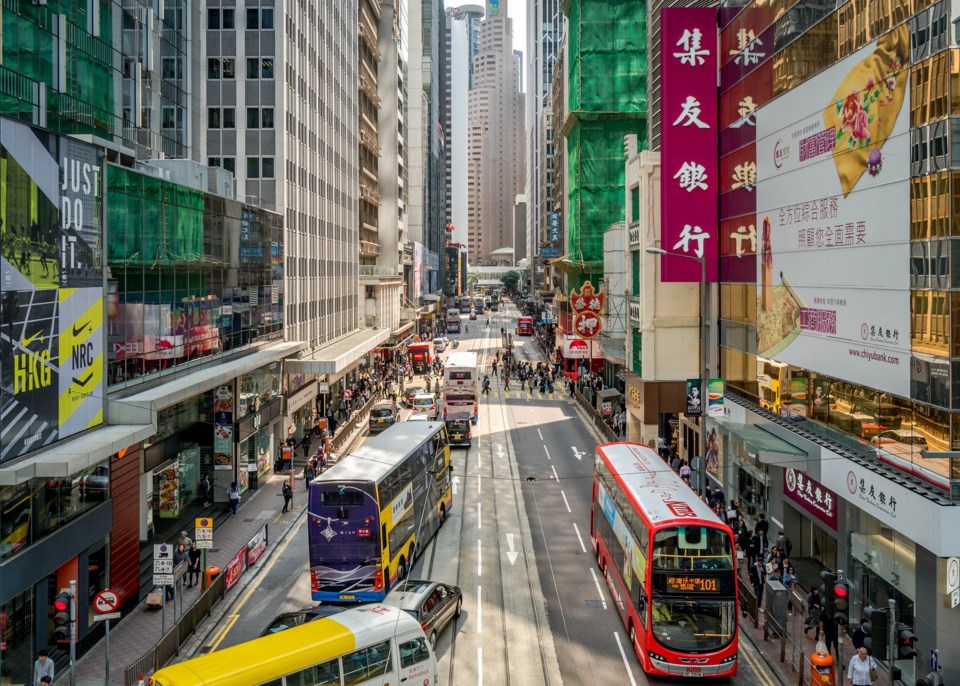Asian markets faced with aging populations and low birth rates – and thereby a shrinking labour force – are now looking at overseas communities like Vancouver as a potential resource.
That’s the case for Hong Kong. The Chinese special administrative region recently made its pitch in the Lower Mainland, touting its newly upgraded admissions scheme for second-generation Canadians with Hong Kong roots to try to deepen the two cities’ already-interwoven people-to-people ties while also filling an economic demand.
“We have put in a lot of effort to attract and retain new talent to work and live in Hong Kong,” said Florence Tsang, acting director of the Hong Kong Economic and Trade Office in Toronto, at a recent Vancouver event. “And since there are a lot of second-gen people from Hong Kong here, we have put in an admission scheme to encourage them to return.”
The program – which had existed in some form since 2015 but was updated last year – sees Hong Kong dramatically reducing its requirements for allowing qualifying second-generation offspring of the city’s permanent residents to return for work. The scheme allows qualifying individuals (aged 18 to 40, born outside “Greater China,” with one parent who holds a valid Hong Kong ID card and holding appropriate levels of education/language proficiency) to get legal permission to live and work in the city without having to first secure a job.
The strong links between Vancouver and Hong Kong are well documented. After magnate Li Ka-shing’s purchase of Vancouver’s Expo lands in the late 1980s, waves of immigrants and investors from the former British colony poured into the Lower Mainland for a decade.
Since then, a large number of offspring have returned to Hong Kong after coming of age to pursue economic opportunities there, and officials estimate as many as 300,000 Hong Kong residents currently hold Canadian passports.
“The Canadian population is one of the largest overseas expat communities in Hong Kong right now,” Tsang said. “These connections are getting more frequent, and we are facing an aging population and a declining workforce at the same time … so do spread the word if you see someone who is eligible and interested.”
Kevin Huang, executive director of the Vancouver-based non-profit cultural heritage group Hua Foundation, said that while there might have been murmurs of some of those young people who moved back to Hong Kong earlier now contemplating a return to Vancouver for family reasons, the overwhelming trend of movement between Vancouver and Hong Kong remains in the Canada-to-Asia direction due to economics.
As such, an effort like Hong Kong’s to attract more Canadians with Hong Kong heritage back to Asia is logical, he said, and might even strike a nerve with young Metro Vancouverites in minority communities feeling they have hit the “bamboo ceiling” in Canadian workplaces.
“Going back home to work after studying abroad is a long-standing tradition for the people of Hong Kong,” Huang said, noting that several friends made the move specifically because they felt limited by the market size of Vancouver.
“The sense I get now is that there seems to be more career growth potential in Asia, especially if they are looking for positions with multinational conglomerates … and I don’t think we are doing a very good job of integrating people in our economy.
“When people don’t feel integrated, they may look back at Asia as more of an option.”
Tsang noted, however, that it is not just multinational conglomerates that are driving Hong Kong’s desire to reinvigorate its workforce.
She noted that the city is stepping up its effort to establish itself as the main startup hub in Asia, with 2,300 such companies already in the region and a doubling of domestic expenditure on R&D, as well as the offer of additional tax benefits for private firms’ R&D costs if they decide to conduct such operations in Hong Kong.
The drive for innovation – especially when linked with fresh talent from outside Hong Kong – would bring new economic impetus to the city, Tsang said.
However, the city has its challenges. Hong Kong has chafed under Chinese rule in recent years as the growing rich-poor gap and a perceived erosion of the city’s westernized Cantonese culture and institutions under Beijing have sparked protests like 2014’s Umbrella Movement, with ongoing friction over the city’s political future creating a sense of uncertainty that could discourage Cantonese-Canadians who grew up in Canada and other human resources talent.
Eva Cohen, a Canadian filmmaker and former Vancouver journalist who splits her time between Hong Kong and Beijing, said another stress factor for Hong Kong is the increased uncertainly over its identity within China, because the city no longer has the advantage of being dramatically wealthier compared with cities like Shanghai and Shenzhen.
Cohen said that she sees no concerted push directly from Hong Kong groups in Asia to pursue second-generation Canadian residents.
But she noted that the overall trend of hiring people of Chinese descent is becoming more prevalent throughout the Chinese market, which could be an opportunity for Canadians with legacy links with the culture – if their language proficiency is sufficient.
“There’s definitely a push in China now, with thousands of their own overseas students graduating and coming back, that they prefer a bilingual Chinese person for any job versus just a ‘foreigner,’” Cohen said. “That’s definitely a thing of the past; even if you are based here in China as a foreigner, it’s still very hard, and you still have to work on your Mandarin fluency. There is no longer a reliance on foreign talent because they have enough of their own now.”



